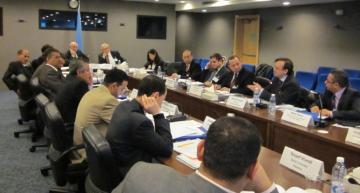18
February
2011

Information and communications technologies (ICT) play a key role in creating the climate of change spreading throughout the region, where internet users have reached around 55 million people, said Director of ESCWA Information and Communication Technology Division (ICTD) Youssef Nusseir. His statements came in the opening of ESCWA meeting on "Regional Harmonization of Cyber Legislation," held at the UN House on 16-17 February.
"Social networking platforms such as Facebook and Twitter will continue to play a critical role in organizing social and civil movements in the Arab world, especially among the youth, according to the first Arab social media report, issued by Dubai school of government," said the ICTD Chief.
Organized by ICTD, the meeting was held to promote the advantages of cyber legislation harmonization across the Arab region. For this purpose, it gathered a crowd of cyber legislation and information technology experts representing Arab governments, the private sector, regional and international organizations as well as non-governmental organizations working in the field of cyber legislation.
"The (Arab social media) report states that the total number of Facebook users in the Arab world has increased by 78 percent, from 11.9 million in January 2010 to 21.3 million by December of the same year, with youth representing 75 percent of the Facebook community in the Arab region," said the ICTD chief, who went on to warn against the dangers surrounding the virtual world despite the many opportunities it offers. "Threats are created by the vulnerability of these technologies to manipulators," who abuse users' personal information in this cyber world. “Therefore, there is a clear need to provide a legal and legislative environment that guarantees trust and security for citizens and public and private sectors when using e-services."
At the meeting, ESCWA proposed the creation of a regional network of experts and institutions active in cyber legislations. The meeting also served as an open forum enabling participants to review, discuss, evaluate and propose improvements to the six directives of cyber legislation covering the following areas: personal data protection, e-communication, e-signature and e-transactions, e-commerce and consumer protection, intellectual property rights and cyber crime.
The Regional Commission has been working on cyber legislation for a few years now. It continuously issues publications on the matter, which review the status of cyber legislation in Arab countries. In late 2009, it began implementing a project entitled "Regional harmonization of cyber legislation to promote the knowledge society in the Arab world" with the aim of enhancing regional integration, boosting member countries' capacities to develop information societies, building a sustainable sector for ICTs through the development of regulatory and legal frameworks, and harmonizing cyber legislation.
Nusseir stressed the importance of cooperation and coordination among regional and international bodies to speed up the process of promulgating and harmonizing cyber laws and legislations. "This comes from our conviction that the internet is in essence a world with no geographical borders. Articulating harmonized laws in neighboring countries would facilitate the application of this no-boundary principle to e-services, in a secure way that promotes trust in electronic applications."
This would reflect positively on the economic situation of these countries by ensuring work opportunities for educated youth, which helps in checking brain drain.





